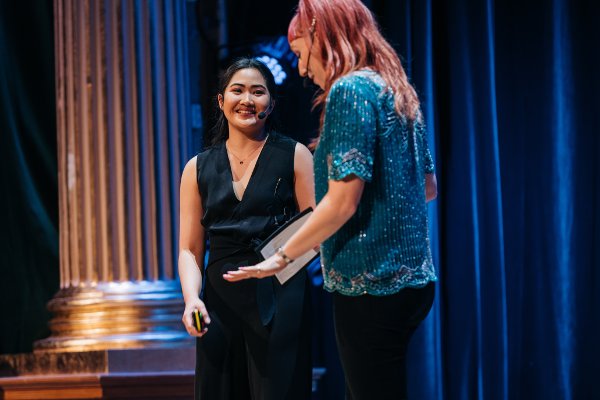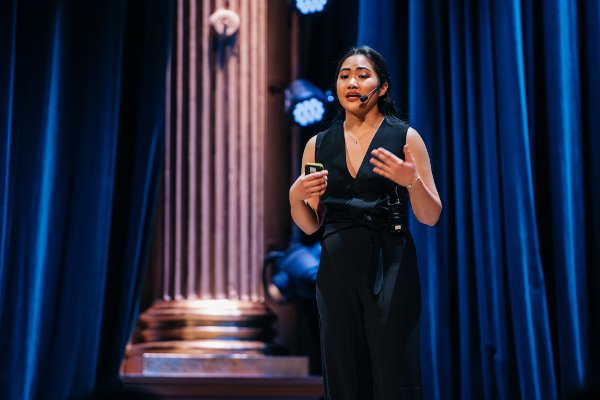Filipina scientist Sophia Raine Hernandez won second place at the Forskar Grand Prix in Sweden where she presented in exactly four minutes a way to defeat the parasite that causes malaria, a disease that kills hundreds of thousands of people every year.
Using the CRISPR-Cas9, a tool that allows scientists to edit parts of an organism’s genetic instructions, Hernandez proposed to remove portions of the parasite known as Plasmodium to find its weaknesses.
“[This] will help in the development of interventions, vaccines, and treatments against malaria,” Hernandez said during the final heat of the Grand Prix on Nov. 25 held in Stockholm.
The Forskar Grand Prix is a competition among researchers in Sweden who can “make the most understandable, captivating, and inspiring presentation of their research” in just four minutes.
Even if she had more time, Hernandez said she would have refrained from adding more to her presentation. “Maybe I would even remove some parts just so I could talk at a better pace. I think in science communication less is more,” she explained.
Hernandez presented her project as a doctoral student in molecular biology at the Umeå University titled “Tackling Malaria by Looking at the Biology of Parasites,” which she started in August 2020.
“It is extremely important for researchers to communicate science to the general public because everyone benefits from the advancement of science. I think it is the best way to combat misinformation or fake news,” she said.
Hernandez, a graduate of the molecular biology and biotechnology program at the University of the Philippines, began her presentation with a reference to her childhood dream of becoming a superheroーand turning into a scientist instead.
“Scientists, like superheroes, work with people to help defeat villains such as bacteria, viruses, fungi, and parasites,” she told the judges at the competition.

Photo from Sophia Hernandez
For Hernandez, the arch-nemesis is Plasmodium because of the parasite’s “ability to make people really sick, killing about 500,000 people per year in different places such as Asia, Africa, and Central America.”
The World Health Organization has noted that malaria “remains a primary cause of childhood illness and death in Sub-Saharan Africa,” with over 260,000 deaths among children below five years old annually. The first ever vaccine for malaria (Plasmodium falciparum) was approved for use only on Oct. 6, 2021, following 30 years of research and development.
While the task of communicating science is “definitely intimidating,” Hernandez emphasized that it is not impossible.
“Because there are so many concepts and jargon for scientists[,] it might feel like it would be impossible to make people understand but I think everyone has the capability of appreciating and understanding science,” she said.
“We just have to find the balance of making it accessible while still being accurate and not overly simplified.”
In coming up with her winning superhero storyline, Hernandez recalled a lesson from one of her coaching sessions with Anders Sahlman, a science communication coach: that a good way to present or communicate your research is “to make it relatable to people.”
“I thought people would relate to this desire [to become a superhero] and … ending it with ‘scientists as modern-day superheroes’ would also encourage people to develop more interest in the sciences or even think about becoming a scientist,” she said.
Before joining the competition, Hernandez had been recognized for her work on Plasmodium in 2019 at the Wellcome Trust Sanger institute in the United Kingdom, one of the premier centers of genomic discovery. Her undergraduate thesis also involved studying the sex-specific immune response of mice to immunization with malaria proteins.
“I had always been interested in infectious diseases, not only because of their global health impact but also because infectious disease-causing agents, such as Plasmodium which causes malaria, have very interesting biology,” Hernandez said.
While she is still at the very early stages of her project, Hernandez said she hopes her research “contributes more to our understanding of the parasite, how the parasite behaves, what genes it needs or uses or [are] essential for it to survive.”
Hernandez was among the seven finalists from the regional heat in Umeå and two others online in November last year.
First prize in the Grand Prix went to communication and media researcher Michael Bosetta of Lund University for his study on “fake news” on Twitter and emotions in political advertisements on Facebook. Louise Karlsson of Halmstad University won third prize for her research on stress-related diseases.
